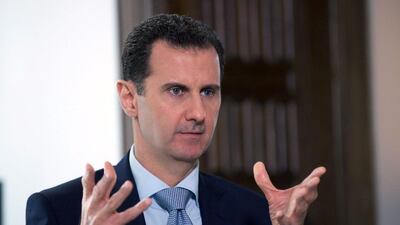In conversations, European officials will strenuously deny that the European Union’s attitude towards Bashar Al Assad has changed. Officially, it has not, but several developments suggest that Europe is boxed in by realities on the ground making Mr Al Assad’s exit far less of a priority to them.
The Europeans insist that for there to be a settlement in Syria, Mr Al Assad must go. However, their primary focus today is not on how the war in Syria will end, but on how to curb the flow of refugees to Europe and the threat of ISIL.
In practical terms this means ensuring that the Syrian conflict will not deteriorate further. That may not be easy, but what the Europeans fear above all is a collapse of the Syrian state and the takeover of much of the country by jihadi groups. Such a scenario would mean the stream of refugees would probably expand.
Mr Al Assad and his supporters in Moscow and Tehran have been making the same argument. Talk about the Syrian president leaving office is meaningless without an alternative. Because Mr Al Assad’s rule has long been based on making the regime a substitute for the state, so that if the first falls, the second will follow.
One of those sensitive to the dangers of this is Barack Obama. When American officials urged him to do something in Syria, Mr Obama’s response, according to many accounts, was to ask what would come after Mr Al Assad. He rarely received a satisfactory answer, and as a result became a de facto defender of the status quo.
When America sneezes Europe catches a cold. With the White House insisting on a clear-cut transition in Syria, the Europeans have no latitude to disagree. That hardly means they approve of the Syrian president, but it does mean that without a realistic endgame of their own, they have effectively gone along with his defenders.
Indeed, the European approach to Russia in particular is quite remarkable these days. Vladimir Putin may have behaved outrageously in Ukraine, but many Europeans have high hopes that Russia can shake up the situation in Syria and create openings for a political settlement.
Mr Putin is perceived as a silver bullet of sorts: someone who can eventually push Mr Al Assad to accept a political solution; and someone who can reinforce the regime against ISIL. The Russian leader has gained considerable leverage from this confidence.
In the conceptual framework of the Europeans, the Geneva talks are the means through which Mr Al Assad will ultimately surrender power. This is in Moscow’s interest, they believe, because Russia is facing economic sanctions over Ukraine as well as low oil prices. Mr Putin cannot afford an open-ended drain on his economy.
That assessment may be true. However, it fails to take into consideration that Mr Putin is facing conflicting imperatives: he needs to alleviate his economic problems, yes, but he also has to remain consistent with regard to his objectives in Syria.
The Russian leader may not be an admirer of Mr Al Assad either, but he can see that his Syrian counterpart is resisting any political transition in which he would step down. Yet Mr Putin entered Syria to avoid Mr Al Assad’s forcible removal, so he has no easy way of ensuring the Syrian leader will accept the Geneva process.
If Mr Al Assad continues to refuse a transitional government, as he has, what are Mr Putin’s options? To tell the Syrian leader that he is on his own? How realistic is that when Russia deployed its armed forces to ensure that Mr Al Assad would not be on his own? How practical is it when the Syrian leader can shift tack and rely on Iran to support his maximalist positions?
In other words Russia’s leverage is limited. Yet the tendency to see Russia as the deus ex machina in Syria means going along with Mr Putin’s interpretation of the situation. And what we have seen in the past year is a steady abandonment of the notion that a political process must begin with Mr Al Assad’s removal.
On the contrary the United States has backtracked, urging the opposition months ago to use “creative language” on the Syrian president’s role in a transitional phase. The concessions have continued, with the United Nations envoy, Staffan de Mistura, proposing last week that Mr Al Assad remain president during the transition, with three deputies to be named by the opposition.
That Mr de Mistura claimed the idea was not his did little to soothe opposition representatives, who angrily rejected the proposal. They can see that the consensus is shifting in Mr Al Assad’s favour.
It was revealing that at a recent dinner in Beirut a European civil servant described Saudi Arabia as an obstacle to a solution in Syria. It didn’t seem to occur to him to mention the Syrian leader.
Michael Young is a writer and editor in Beirut
On Twitter: @BeirutCalling


